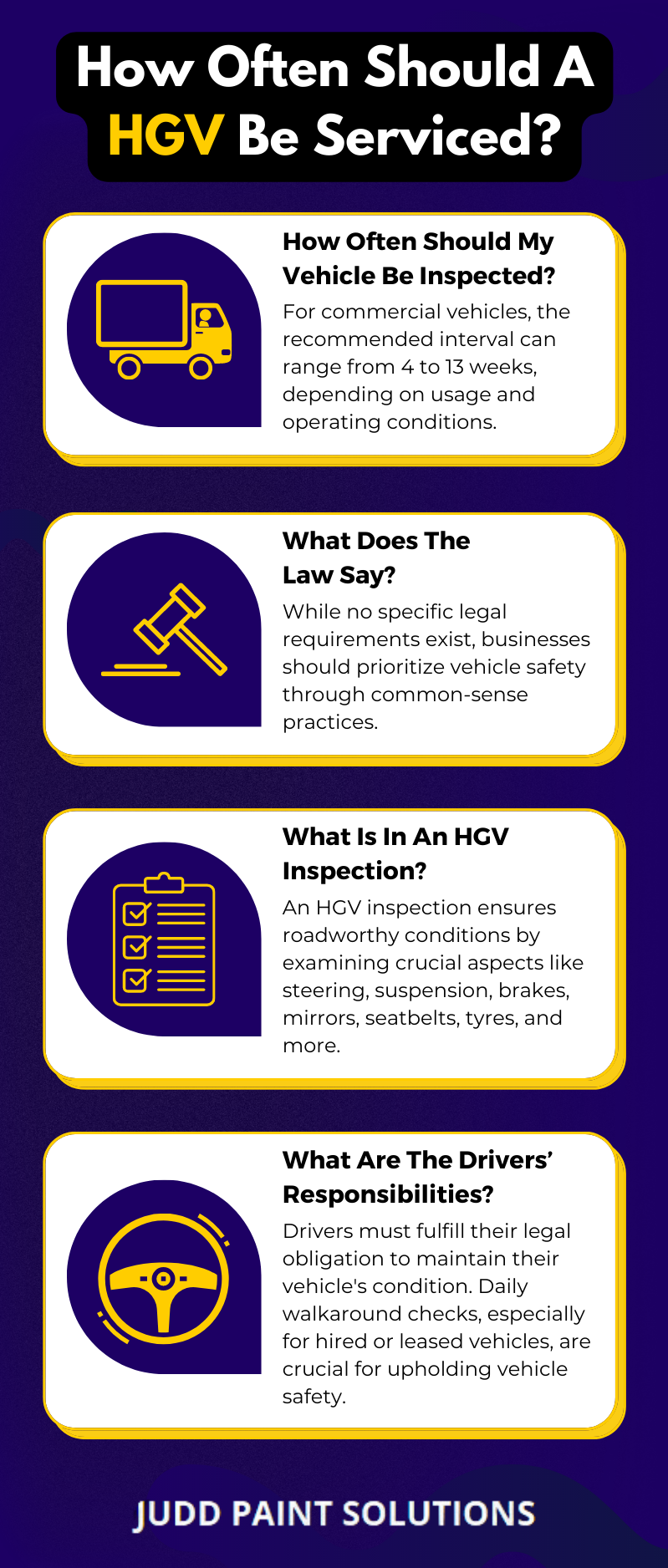How often should a HGV be serviced? Our guide outlines the recommended service intervals for Heavy Goods Vehicles. Discover expert insights on maintaining peak efficiency, safety, and compliance. Learn when to schedule essential maintenance to keep your HGV fleet running smoothly.
How Often Should My Vehicle Be Inspected?
Regular vehicle inspections are vital for ensuring the safety and roadworthiness of commercial vehicles. The frequency of these inspections may vary depending on factors such as the nature of the work, mileage covered, and terrain conditions.
The standard interval for safety inspections typically falls around 6 weeks. However, it is important to note that the recommended inspection interval for all commercial vehicles ranges from 4 to 13 weeks. The specific interval may vary based on the vehicle's usage and operating conditions.
In cases where vehicles are involved in quarry work or frequently navigate building sites, accelerated wear and tear can occur. Consequently, more frequent inspections are advisable to promptly identify and address any potential issues. Conversely, vehicles with low mileage and light loads may opt for longer inspection intervals, typically between 8 to 13 weeks.
Regular vehicle inspections focus on crucial components such as brakes, suspension, steering, tires, lights, and overall structural integrity. It is essential to ensure inspections are conducted by qualified individuals or authorised inspection facilities who possess the necessary expertise and knowledge. By adhering to appropriate inspection intervals and conducting regular vehicle maintenance, operators can uphold safety, reliability, and compliance standards.
These proactive measures minimise the risk of accidents resulting from mechanical failures and foster a safe road environment. Always refer to relevant regulations, guidelines, or industry standards to determine the specific inspection recommendations for your vehicle type and usage. Prioritising vehicle safety and adjusting inspection frequency based on work demands and operating conditions will contribute to optimal vehicle performance and safety.
HGV Inspections
Ensuring the safety and roadworthiness of HGVs is crucial for both operators and drivers. HGV inspections play a significant role in identifying and rectifying any defects or issues that may compromise the vehicle's performance or pose a risk on the road.
Here's a breakdown of the different types of inspections and their intervals:
Daily Checks
Performing daily checks is an essential part of vehicle maintenance. These checks cover a comprehensive list of vehicle parts, electrical connections, brake lines, trailer coupling, reflectors, windows, number plates, horns, and lights.
While this list provides a starting point, it is not exhaustive, and additional checks specific to the vehicle may be necessary. The DVSA provides a full list of daily checks that should be carried out, along with forms for recording any defects if found.

Regular HGV Safety Inspections
Referred to as HGV 6-weekly inspections, these inspections are a legal requirement. The frequency of these inspections will be determined during the application process to the Traffic Commissioner's office. The DVSA provides guidance on the inspection intervals, taking into account factors such as vehicle age, condition, mileage, and operating conditions.
The frequency of inspections should be carefully considered, with shorter intervals recommended for vehicles operating in challenging and demanding conditions. Equivalent annual mileage should also be taken into consideration when determining inspection intervals.
The DVSA strongly advises that any vehicle that has been out of service for a significant period of time should be inspected before being put back into operation. Furthermore, vehicles and trailers that are over 12 years old should undergo inspections at intervals no longer than 6 weeks.
Flexibility in Inspection Intervals
The DVSA encourages operators to adopt a proactive and evidence-based approach to setting inspection frequencies. While a 6-week interval is a good starting point for many operators, it should be regularly reviewed based on inspection results and vehicle performance.
Operators can request an extension to the inspection interval if they can demonstrate to the DVSA Traffic Commissioners that their vehicles can be operated safely for longer periods without any serious defects, promptly addressing minor defects as they arise. Operators should provide evidence justifying the extension and communicate their request to the Traffic Commissioners.
By conducting regular inspections and addressing any defects promptly, operators and drivers can ensure the safety, compliance, and roadworthiness of HGVs. Adhering to the recommended inspection intervals and following the guidelines provided by the DVSA and Traffic Commissioners contribute to a proactive approach to vehicle maintenance and overall safety on the road.
What Does The Law Say About Commercial Vehicle Checks?
Complying with the law and ensuring the safety of commercial vehicles is a legal requirement for operators of heavy goods and public service vehicles.
To obtain an O-licence (operator licence), operators must have a maintenance plan that meets the requirements set by the Traffic Commissioner.
Drivers also have a statutory duty to conduct a walk-around check before using an HGV or PSV vehicle. This pre-use check is crucial for ensuring the vehicle's safety and roadworthiness.
However, for regular commercial vehicles that do not fall under the category of heavy goods or public service vehicles, there is no specific legislation regarding the frequency or timing of vehicle checks.

In such cases, employers' responsibilities are covered by the Health and Safety at Work etc Act 1974, which requires them to take reasonable steps to ensure the health and safety of their employees.
Although there are no specific legal requirements, businesses should adopt a common-sense and practical approach to vehicle checks. Prioritizing the safety of vehicles and personnel is essential. Implementing regular vehicle maintenance and inspection procedures proactively contributes to the safety and efficiency of commercial vehicles.
What is in an HGV inspection?
When you schedule your vehicle for an HGV 6-week inspection, you are essentially booking a preventative maintenance check. This comprehensive inspection aims to monitor the vehicle's condition and identify any small defects before they escalate into more significant and costly problems.
An HGV inspection covers all crucial aspects of the vehicle to ensure its roadworthiness. This includes examinations of steering, suspension, brakes, bearings, mirrors, seatbelts, windscreen, tyres, emissions, wiring, lights, and more. The purpose is to verify that the vehicle would be able to pass an MOT (Ministry of Transport) test at any given time.
By conducting these thorough inspections, operators and drivers can proactively maintain the safety and integrity of their HGVs. Identifying and addressing any defects or issues promptly helps prevent them from escalating into more significant problems that could compromise the vehicle's performance and safety on the road.
It is crucial to follow the guidelines and recommendations provided by the DVSA and other relevant authorities to ensure a comprehensive and effective HGV inspection. Regular inspections, along with proper vehicle maintenance, contribute to the overall roadworthiness and reliability of HGVs, promoting a safer and more efficient transportation industry.
What are the drivers’ responsibilities?
Drivers bear significant legal responsibility for the condition of their vehicles while in operation. It is crucial to emphasise that conducting a daily walkaround check is as important as driving the vehicle responsibly.
In cases where a vehicle is hired, loaned, or leased, it is the user's duty to ensure the vehicle's roadworthiness and possession of necessary certifications.
Consequently, drivers must perform a thorough daily walkaround check before using the vehicle.
This routine inspection serves as a proactive measure to identify any defects, issues, or maintenance needs that could jeopardise the vehicle's safety and performance on the road.

Promptly addressing any identified problems is essential for upholding the vehicle's safety and compliance. By fulfilling their responsibility to conduct a daily walkaround check, drivers contribute to road safety and minimise the risk of accidents caused by preventable mechanical failures. It is a vital aspect of vehicle maintenance that supports the broader goal of ensuring safe road conditions for all users.
In summary, drivers have a legal obligation to maintain their vehicle's condition. Performing a daily walkaround check, particularly for hired or leased vehicles, is crucial. By diligently conducting these checks, drivers play a pivotal role in upholding vehicle safety and maintaining a responsible road environment.
If you manage a commercial fleet, you will eventually need to know: What Is HGV Maintenance?
When your commercial cars or vans need maintenance, get in touch. For Commercial vehicles and HGV maintenance in Doncaster and Scunthorpe, follow the link below.

